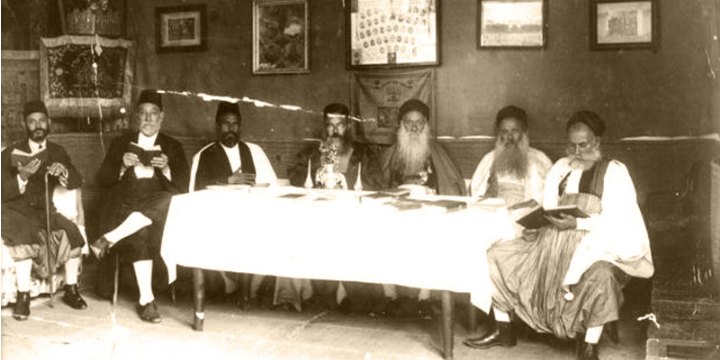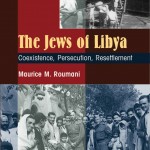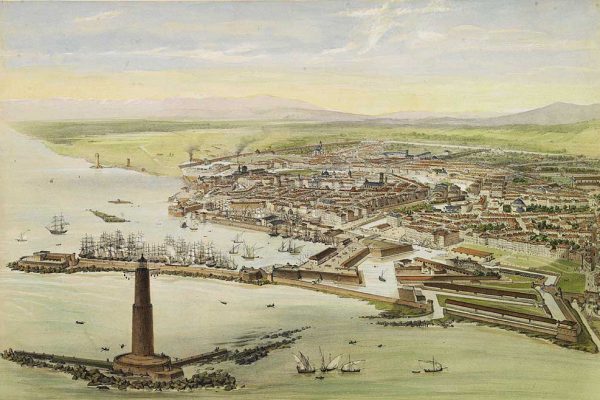Maurice Roumani, The Jews of Libya: Coexistence, Persecution, Resettlement, Sussex Academic Press, 2008
This book investigates the transformative period in the history of the Jews of Libya (1938–52), a period crucial to understanding Libyan Jewry’s evolution into a community playing significant roles in Israel, Italy and in relation with Qaddhafi’s Libya. … Against a background of a reform conscious Ottoman administration (1835–1911) and subsequent stirrings of modernization under Italian colonial influence (1911–43), the Jews of Libya began to experience rapid change following the application of fascist racial laws of 1938, the onset of war-related calamities and violent expressions of Libyan pan-Arabism, culminating in mass migration to Israel in the period 1949–52. …
By focusing on key socio-economic and political dimensions of this process, the author reveals the capacity of Libyan Jewry to adapt to and integrate into new environments without losing its unique and historical traditions. … The evolution of Libyan Jewry between 1938 and 1952 is characterized by three pivotal developments: The first (1938–43) was one of disruption and dislocation, brought about by the oppressive colonial administration allied with Germany. …
In the second (1945–48), riots and pogroms by Muslim Libyan mobs, agitated by pan-Arab and Palestinian sympathies, against Jewish communities left unprotected by the post-war British administration, ushered-in an awakening to the fact that its millennial presence in Libya was about to end. Incipient Zionism among Libyan Jews, particularly in youth movements, matured into fully shared decisions to migrate to Israel where the third pivotal development (1949–52) – encompassing resettlement, economic, social and religious adaptations –began to unfold. … The book concludes with an analysis of the success story of Libyan Jewry in Israel, and in Italy where a group of post-1967 refugees reconstituted a thriving, influential community in Rome.
“Jerusalem and Rome” have thus become the two poles of the renewed Jewish community of Libya, exhibiting political advancement in Israel, and commercial prosperity in Italy, along with a cultural renaissance and potential contributions to the ongoing process of reconciliation of the new Libya (as of 2005) with the West. “In this pioneering work, examining the crucial period from the Italian racial laws of 1938 to the final Jews exodus from Libyan soil in 1967, Dr Maurice Roumani builds on the foundations laid by the scholars of the Jewish communities of the Maghreb – H.Z. Hirschberg, Shlomo Dov Goitein and Michel Abitbol – giving us for the first time a full, clear and remarkable picture of what is now a lost community, alive and flourishing only as a world-wide diaspora, with Israel as its centre. … The extent of Dr Roumani’s scholarship illuminates the story of Libyan Jewry in its final five decades: its early Zionism, its period under Italian monarchist and then Italian Fascist rule, its torments during the war years, its literal liberation and mass emigration under the British, and its final years under Arab and Muslim rule. He gives the reader an impressive account of the workings of the Jewish community, its personalities, its strengths and its achievements. …
There is much in Dr Roumani’s final chapters that is dramatic, much that is tragic; yet the extraordinary efforts to secure the emigration of Libyan Jews is an inspiring story. In telling it, as in each phase of this book, Dr Roumani uses a wide range of archival and oral sources, many of which have never been used before. Throughout the book, he reveals a mastery of the social and political history, and a fine understanding of the lives, hopes, fears and aspirations of Libyan Jews. His book is a testimony to their suffering and their fortitude.” —From the Foreword, Sir Martin Gilbert
“This is a significant contribution to the modern history of the smallest and, regrettably, least studied Jewish community of North Africa. It is an important case study of Jewish modernization in an Islamic land under colonial rule and national independence, and while exhibiting certain parallels with the diaspora communities in the French Maghreb, it also exhibits no-less-important differences due not only to nature of Italian rule, but to the distinct character of the Libyan Jewry itself. Maurice Roumani has given us an impeccably researched, richly documented, and keenly insightful survey of Libyan Jewry’s social and political evolution in the twentieth century. He brings to the study not merely the observations of a trained scholar with all of the requisite linguistic and methodological skills, but also the real life experience of someone who lived through the turbulent events of the period and was an actual witness to some of them. It is to Roumani’s great credit that he is able to achieve an admirable balance of overall scholarly dispassion with the intimate poignancy of personal engagement. The Jews of Libya will surely take its place alongside the pioneer studies of Renzo De Felice and Harvey Goldberg.” —Norman A. Stillman, University of Oklahoma










